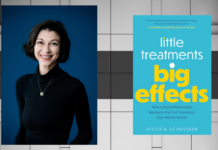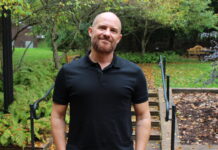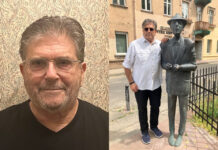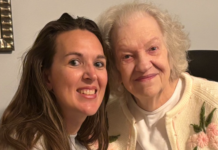Our Medical System Protects Wrongdoers and Punishes Whistleblowers: An Interview with Carl Elliott
MIA’s Ayurdhi Dhar interviews Carl Elliott about scandals in psychiatry and the challenges faced by whistleblowers.
Beyond Paternalism or Abandonment in Mental Health Care: An Interview with Neil Gong
Neil Gong exposes the false choice in mental health policy between tolerant containment for the poor and paternalistic surveillance for the rich.
The Connection Cure: An Interview with Julia Hotz
Julia Hotz is a solutions-focused journalist based in New York City. She is the author of the forthcoming book, The Connection Cure: The Prescriptive...
Conveying Hope, Empowering Teens: An Interview With Jessica Schleider
Clinical psychologist Jessica Schleider is founding director of the Lab for Scalable Mental Health, researching single-session interventions.
Madness, Utopia and Revolt: An Interview With Sasha Warren
Sasha Warren founded Of Unsound Mind to trace the histories of psychiatry and its connection to policing and prisons.
Demedicalizing Depression: An Interview with Milutin Kostić
Justin Karter interviews Milutin Kostić on the fundamental flaws in depression research and its neglect of human complexity.
Leaving Biological Psychiatry Behind: An Interview With Rodrigo Nardi
Rodrigo Nardi is a psychiatrist and psychologist. He obtained his psychology degree in the year 2000, and following that, he obtained a certificate in...
Context and Care vs. Isolate and Control: An Interview on the Dilemmas of Global...
MIA’s Ayurdhi Dhar explores with Arthur Kleinman how healthcare systems often overlook personal stories, focusing on treating diseases rather than individuals. Discover why this renowned Harvard psychiatrist and medical anthropologist believes in restoring humanity to medicine.
Undisclosed Financial Conflicts of Interest in the DSM-5: An Interview with Lisa Cosgrove and...
On the Mad in America podcast we talk with Lisa Cosgrove and Brian Piper about their BMJ paper entitled "Undisclosed Financial Conflicts of Interest in the DSM-5 TR: Cross-Sectional Analysis"
Deprescribing Psychiatric Drugs to Reduce Harms and Empower Patients: Interview with Psychiatrist Swapnil Gupta
Ayurdhi Dhar interviews psychiatrist Swapnil Gupta on psychiatric drug discontinuation, drug cocktail risks, patient choice, and the need for trust and transparency.
Is Madness an Evolved Signal? Justin Garson on Strategy Versus Dysfunction
Philosopher Justin Garson discusses the potential benefit of looking at madness not as disease or defect, but as a designed feature.
‘It Was a Joint Effort’: Deborah Kasdan on Bringing Her Late Sister’s Story to...
Author Deborah Kasdan discusses her memoir of her late sister, "Roll Back The World."
The Psychological Humanities Manifesto: An Interview with Mark Freeman
Justin Karter interviews narrative and philosophical psychologist Mark Freeman about his vision for the future of psychology.
Robert Whitaker Answers Reader Questions on Pharma Marketing and Psychiatric Drugs
In Part 2 of our reader Q&A podcast, MIA founder Robert Whitaker answers questions on pharmaceutical marketing and issues with psychiatric treatments including psychiatric drugs and electroconvulsive therapy.
Robert Whitaker Answers Reader Questions on Mad in America, the Biopsychosocial Model, and Psychiatric...
On the Mad in America podcast this week we have Robert Whitaker with us to answer questions sent in by readers and listeners.
The Making of a ‘Madness’ That Hides Our Monsters: An Interview with Audrey Clare...
In this interview, Audrey Clare Farley reveals how our understanding of schizophrenia was built to avoid acknowledging sexual trauma, religious abuse, and racism.
‘A Playground for Predators’: Diane Dimond on The Abuses of Guardianship
Our guest today is Diane Dimond, a longtime, award-winning investigative journalist specializing in crime and justice issues. As a freelance journalist, syndicated columnist, and...
May Cause Side Effects–Radical Acceptance and Psychiatric Drug Withdrawal: An Interview with Brooke Siem
Brooke Siem discusses her experiences of being medicated with antidepressants as a teenager, her withdrawal from a cocktail of psychiatric drugs and her debut memoir, May Cause Side Effects.
Branding Diseases—How Drug Companies Market Psychiatric Conditions: An Interview with Ray Moynihan
MIA’s Ayurdhi Dhar interviews Ray Moynihan about the marketing of disorders, broadening of diagnoses, and harmful treatments.
How Mad Studies and the Psychological Humanities are Changing Mental Health: An Interview with...
In this interview with MIA's Justin Karter, psychiatrist Bradley Lewis discusses the value of art, the humanities, and mad studies in shaping a richer understanding of psychological experiences.
Embracing the Shadow—Charlie Morley on Lucid Dreaming as Therapy
On the Mad in America podcast, we hear about the potential of lucid dreaming therapy to aid those struggling with post-traumatic stress.
Family Panel Discussion – Supporting a Child, Teen, or Young Person in Crisis
Supporting a Child, Teen, or Young Person in Crisis - Our guest panel, Ciara Fanlo, Morna Murray and Sami Timimi join host Amy Biancolli to share stories of crisis but also stories of healing and of hope.
‘Sacred Conversations’: A Talk with Susan Swim and a Father Whose Daughter Found Healing
We have two guests today. One is Susan Swim, executive director of the Now I See A Person Institute, which she created in 2007...
The Radical Politics of Madness: An Interview with Micha Frazer-Carroll
MIA's Justin Karter interviews Micha Frazer-Carroll about her new book, "Mad World: The Politics of Mental Health."
Can Psychosocial Disability Transform Mental Health? A Conversation with Luis Arroyo and Justin Karter
Mad in Mexico's Luis Arroyo interviews MIA's Justin Karter about how psychosocial disability inclusion can transform Global Mental Health.

































